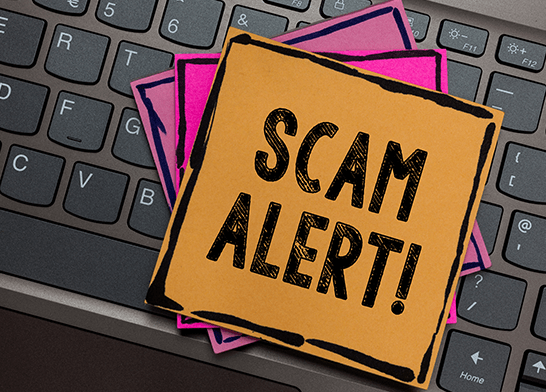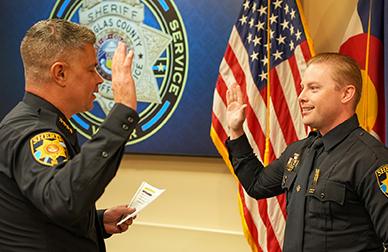Scams to watch out for

Be careful.
Bottom Line: Scammers will attempt to defraud you using phone calls, texts, emails, your social media, and anything else they can think of. Anytime you are asked to send money by MoneyGram, Zelle, gift cards, or Western Union, be suspicious. No government agency takes gift cards, no matter what the scammer says. No reputable company will ever contact you to say there’s something wrong with your computer. The criminals now have easy access to computer programs that make any number they want show up on your phone screen. They have phone numbers that are “anonymized.” There are companies out there that advertise you can get a phone number that will receive a call and “bounce” it to your real phone. No government agency (IRS, Social Security, law enforcement, etc) will call you unless you are already dealing with them about something specific. “Anonymized” emails are common. Scammers can get an email address without any real identification. They create an email address that looks like the “real thing,” but is just slightly different than a real company. If an email address looks like “Amazon” or “Apple” or “Microsoft” but actually ends in “Gmail,” or “Hotmail” or anything similar, it’s probably a scam.
This list of scams isn’t exhaustive, but it contains the things that we see every day.
This scam is one of the most prevalent scams aimed particularly at the elderly. In it the victim receives a phone call, text, or email, telling them that they have won an exorbitant amount of money in the Publisher’s Clearing House lottery. Most of the victims have never even entered the lottery but fail to recall that fact. The scammer tells the victim that they have won millions of dollars, but that they have to send money in order to pay “taxes” or “processing fees.” They typically ask for thousands of dollars to be sent by wire, cashier’s check, gift cards, Venmo, or Paypal. They tell the victim not to tell friends or relatives because it is intended to be a “surprise.”
This scam isn’t just related to Craigslist, it happens on all the online sales applications. The victim places an ad on Craigslist to sell something, let’s say a piano. The ad says the piano is for sale for $600. The scammer contacts the seller, usually by text or email, says that they want to buy the piano, and will send the seller a cashier’s check for $2,000. They want you to forward the extra $1,400 to their “movers.” The victim deposits the check, two days later gets access to the funds, and sends cash or gift cards to the scammer. The victim later learns that the “cashier’s check” was a fake. Banks give you access to the funds in a couple of days, but that doesn’t mean that the cashier’s check has actually cleared. They’re giving you access to the funds as a courtesy. Victims who fall for this scam never seem to ask the criminal why they would buy a $600 piano and pay $1,400 to move it across the country.
In this scam online criminals reach out to teenagers through several of their social media applications. They typically tell the young student that they are willing (for a variety of “reasons”) to help support them at school. They engage the unsuspecting victim with stories of helping “deserving young people.” Eventually, they will send the victim fraudulent checks and ask them to deposit the funds in the victim’s account. When the checks bounce, the victim is out the money. This scam can go even further. It is not uncommon for the scammer to get the victim to actually launder the funds for them, thereby engaging the victim in an ongoing offense.
Today, large numbers of people meet others online. Scammers attempt to “groom” prospective victims, often for months. They talk like it’s a romantic relationship, but it’s not. Eventually, they ask for money. There are signs that the contact is a scammer. They will tell the victim that they are a wealthy individual, often working overseas at the moment (they are an engineer, or working for the government, or in the military). They will send attractive photos that they have taken off the web. They will often send pictures of fake IDs, or bank statements. Typically, they will send a photo of a fake passport. They will often send an official looking document stating that they have a large contract for a lot of money. For some “reason” they never seem to be able to meet in person. Then, a “crisis” arises in which, despite the fact that they are “rich,” they need the victim to send money. Once the victim sends a wire transfer to the scammer, that money is gone. It’s transferred out within minutes. Often, the individuals that the victim sends money too are, themselves, victims of the scammer. They are called “money mules.” They move the money on and don’t even know that they are committing a crime.
In this scam the victim sees an ad for a car for sale at a very attractive price. The “story” is one of two usual things; either “my spouse died and I can’t bear to have his/her car around,” or “I’m in the service and have to immediately deploy to Iraq, have to sell the car fast.” The scammer then gets the victim to send money for a car that doesn’t even exist.
This scam is brutal. The criminal has an actual “checklist” (you can find it on the web) where they start by selling the puppy that the victim found online for $600. After the victim sends the $600, they are told that they need a special crate for another $800 dollars or so. If the victim sends that money, they are told that they need to buy refundable insurance for a $1,000 or so. If the victim hasn’t caught on yet, they are told that the puppy needs special shots to comply with Federal shipping regulations. This goes on and on. The fact is, there never was a puppy, it just didn’t exist.
In this scam you get a popup on your computer telling you that either (a) there is a virus on it, or (b) your anti-virus software is being cancelled. The scammer has you call a number (you think it’s Apple or Microsoft support). They then talk the victim into giving them access to the victim’s computer. Once they get access they tell the victim “oops, I put $10,000 into your account, not the $1,000 that was supposed to go in. If you don’t give us back the extra $9,000 “you’ll be arrested” or “I’ll get fired.” The victim looks at the account, and sure enough, there’s a deposit for $10,000. What the victim doesn’t realize, is that the criminal just transferred the $10,000 from the victim’s savings to the checking. They most often tell the victim to buy gift cards and read the numbers over the phone. Once the victim does that, the money is gone. The latest twist is to have the victim take cash out of their bank account and deposit into a cryptocurrency ATM. This money is gone in an instant.
If this happens to your computer, just hit Control, Alt, Delete, and sign off. When you sign back on the popup will be gone and your computer will work fine.
This scam also can start out with the message that “records indicate that you purchased a flat screen TV (or a cell phone, or a laptop, or other high dollar item). If you did not make this purchase, contact Apple (or Amazon, or Paypal) at this phone number.” The person on the other end of the call is a criminal. Never call a phone number or contact an email address that could be given to you by the scammer. If you want to call Amazon, Paypal, Apple, or your credit card company, obtain the phone number or email address on your own.
The victim sees a number pop up on their phone screen that seems to be from a government agency; IRS, Social Security, police, etc. The criminal tells the victim a story; you need to “update” your social security number,” “you missed jury duty,” etc. The victim is again told that they have to make a large payment by gift cards or they will get in trouble. The victim is made to drive around to multiple stores to get high dollar gift cards and is told if they hang up the phone they will be arrested. The victim is told to tell suspicious store clerks that the money is for a grandkid’s graduation, or office party awards, or something similar.
In this one the victim receives a call from her “grandson” saying I’ve caused an accident in some remote place, and hurt a pregnant woman. I need cash sent for my jail bond. When the victim says “you don’t sound like my grandson,” the criminal says “that’s because I broke my nose in the accident.” He/she also says “please just send the money and don’t tell mom.”
The victim posts his/her resume on a job site. Criminals spend all day scanning these resumes. They reach out to the individual looking for work and promise either a “work at home” job, or “we’re opening a new office in your area.” They always conduct the “interviews” by text or chat. They send a fake check and tell the victim to send cash or gift cards to “buy materials to set up the office.” A red flag on this one is that, since the criminal sent out hundreds or thousands of these emails or texts, they probably don’t know where the victim is at first. So, the response says “in your area,” not “in Denver.” It only becomes “in Denver” after the victim makes the initial response to the scammer’s email and the scammer knows where the victim actually is.
In this scam you get an email telling your that your “service contract” has been renewed. “If you have any questions, call this number XXX-XXX-XXXX.” When you call, you get a prompt telling you to “Press 2 to continue.” If you press 2 the scammer takes over your phone.
This one is almost impossible to avoid, because the victim doesn’t really “fall” for any scam. It’s done remotely without any action on your part. As a result of years of hacker break ins to big companies, almost everyone’s ID info is out there to be bought on the dark web. All you can do to protect yourself is freeze your credit at all three agencies and keep it frozen until you need to open credit yourself. Then only open it for a couple of days.
Victims regularly report receiving messages that turn out to be scams. The message could be on email, Facebook Messenger, Instagram, etc. Basically, it looks like it came from someone you know, but it’s really the criminal. To protect against this, people pretty much need to confirm live and in person, any message that seems odd or asks them to do something.
Criminals often break into mail boxes and steal ID information. It is very unsafe to put a check into a residential mailbox. Criminals steal checks and “wash” them. They can delete the payee and the amount you wrote with nail polish remover and a Q-tip. It’s safer to utilize a post office mailbox for anything important.
This crime is typically committed against females who are shopping for groceries. Quite often women shoppers will have their open purse in the shopping cart. There are teams of criminals who actually follow women around in the supermarket waiting for an opportunity to commit the crime. One of the criminals will come up to the victim and ask her a question about some food item. While the victim is distracted, the criminal’s partner will steal the wallet from an open purse that’s sitting in the cart. The offenders will be out the door and using the victim’s credit cards before the victim even gets to the checkout line and realizes that the wallet and cards are gone.
It’s important to know that, once scammers have contacted you and know that they have a “live” phone number or email address, they’ll attempt other, additional scams. If you’ve been a victim of a financial crime, it’s best to freeze your credit. Contact Experian, Equifax, and/or Trans-Union.
Freezing your credit is relatively easy and it can be unfrozen if you need to apply for credit yourself.




